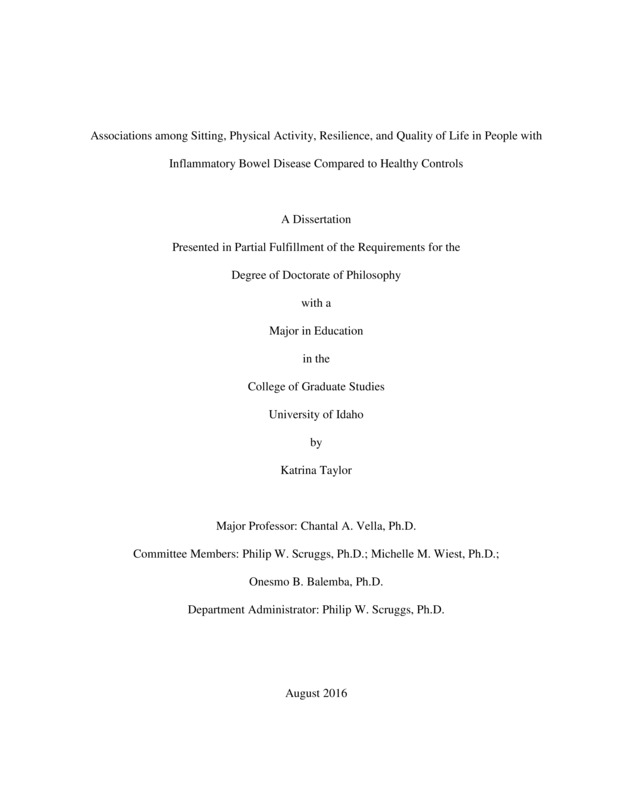Associations among Sitting, Physical Activity, Resilience, and Quality of Life in People with Inflammatory Bowel Disease Compared to Healthy Controls
Taylor, Katrina. (2016). Associations among Sitting, Physical Activity, Resilience, and Quality of Life in People with Inflammatory Bowel Disease Compared to Healthy Controls. Theses and Dissertations Collection, University of Idaho Library Digital Collections. https://www.lib.uidaho.edu/digital/etd/items/taylor_idaho_0089e_10984.html
- Title:
- Associations among Sitting, Physical Activity, Resilience, and Quality of Life in People with Inflammatory Bowel Disease Compared to Healthy Controls
- Author:
- Taylor, Katrina
- Date:
- 2016
- Embargo Remove Date:
- 2018-08-16
- Keywords:
- Health-Related Quality of Life Inflammatory Bowel Disease Physical Activity Sedentary Behavior
- Program:
- Movement & Leisure Sciences
- Subject Category:
- Health sciences
- Abstract:
-
PURPOSE: The aims of the study were to (i) determine whether the 10-item or 25-item Connor-Davidson Resilience Scale (CD-RISC) was a valid measure of resilience in people with inflammatory bowel disease (IBD); (ii) understand the differences in health-related quality of life (HRQOL), physical activity, sitting, and resilience levels among IBD disease states (i.e., disease remission versus disease flare) and healthy controls; and (iii) explore the associations among differing intensities of physical activity, resilience, and HRQOL in people with IBD. METHODS: IBD participants (n = 242) and healthy controls (n = 265) completed an online survey measuring physical activity, sitting, resilience, and HRQOL levels using previously validated surveys. Confirmatory factor analysis, analysis of covariance, and multiple regression were used to address the aims of the study. RESULTS: The 10-item CD-RISC was found to be a more valid measure of resilience in people with IBD than the 25-item instrument. HRQOL was lower in both IBD groups compared to healthy controls with IBD-flare participants exhibiting the lowest levels of HRQOL. Physical activity levels were higher in healthy controls than people with IBD, with no differences between disease states. There were no differences in time spent sitting across groups. Moderate-to-vigorous physical activity (MVPA) and walking were independently associated with physical but not mental HRQOL. Participants with higher levels of activity reported higher levels of physical HRQOL. CONCLUSIONS: People with IBD have lower HRQOL, physical activity, and resilience levels compared to healthy controls but with no differences in time spent sitting. Furthermore, HRQOL was negatively impacted by a disease flare but disease state did not affect physical activity or resilience levels. Walking and MVPA were independently associated with physical but not mental HRQOL and participants with higher levels of activity reported higher levels of physical HRQOL. Future research is warranted to investigate these findings using objective measures of physical activity and sitting.
- Description:
- doctoral, Ph.D., Movement & Leisure Sciences -- University of Idaho - College of Graduate Studies, 2016
- Major Professor:
- Vella, Chantal A
- Committee:
- Scruggs, Philip W; Wiest, Michelle M; Balemba, Onesmo B
- Defense Date:
- 2016
- Identifier:
- Taylor_idaho_0089E_10984
- Type:
- Text
- Format Original:
- Format:
- application/pdf
- Rights:
- In Copyright - Educational Use Permitted. For more information, please contact University of Idaho Library Special Collections and Archives Department at libspec@uidaho.edu.
- Standardized Rights:
- http://rightsstatements.org/vocab/InC-EDU/1.0/

